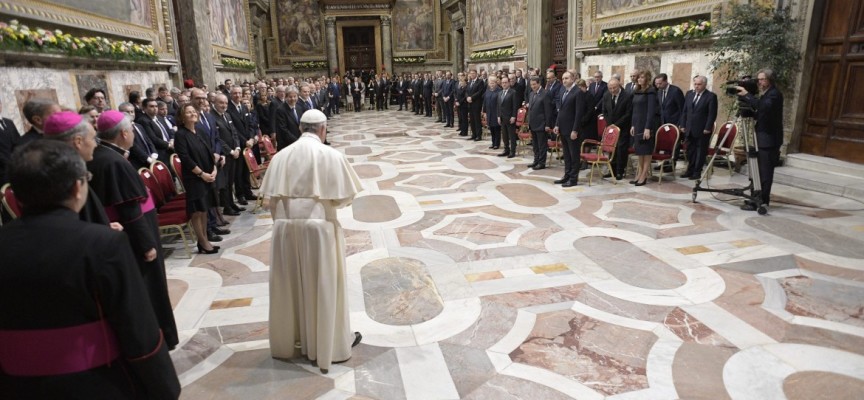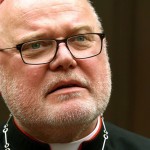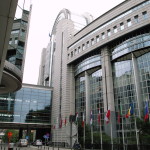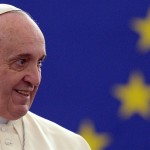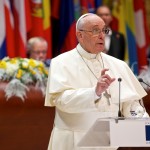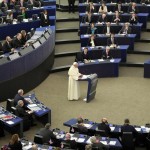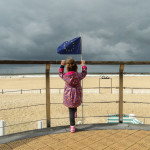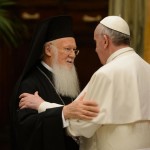Following the meeting with the European leaders in the Vatican, during which Pope Francis delivered a strong message for Europe, the Pontiff visited one of its most vital and emblematic centers. The Pope’s journey in the Archdiocese of Milan was brief but packed with events. The occasion, the 60th anniversary of the treaties that marked the beginning of the process of european unification, came in a time of crisis, of fear and bewilderment towards new and disturbing, though predictable, scenarios.
The Pontiff’s word was strong, imbued with realism and trustingly open to the future. It seems that only an American Pope with deep Italian roots could deliver these words. Bergoglio chose to speak about memory and hope, underlining their unbreakable bond. “We cannot understand the time we live in without considering the past, which is the lymph that gives life to our present, and not a simple assemblage of events”.
It is easy to recognize the line of reasoning in the Pope’s speech, based on the persuasive references to the Founding Fathers of the European Unification – a process that, however born out of economic exigencies, bore the then-clear awareness of “a way of understanding human beings based on their transcendent and inalienable dignity”, as emphasized by Alcide de Gasperi in one of his last discourses, in fidelity to the “spirit of European solidarity” evoked at the signing of the treaties.
In 1957 Europe was facing the consequencies of the World War, including the stifling blanket of the “unnatural barrier that divided the continent from the Baltic Sea to the Adriatic”. Today, however, the economic well-being that “clipped Europe’s wings” has erased the memory of the reconstruction, of the “efforts” that were necessary in order to overthrow that barrier, of the “longest period of peace” that Europe has known in centuries.
It is thus necessary to return to the spirit of service, to political passion and to “the awareness that the ‘origins of the European civilisation lie on Christianity’, without which the occidental values of dignity, freedom and justice would appear largely incomprehensible”, the Pope said, once again quoting De Gasperi. And today, “those values will continue to make sense only through the conservation of their vital connection with their deepest roots. The productiveness of this connection lies in its potential to establish authentically ‘laic’ societies, free of ideological conflicts”, the Pontiff continued. He then added that in these societies everyone, without distinction of origins, believers and non-believers alike, can and will have a place.
This is the path to follow in order to overcome the distrust of Europe, which is by now seen as an “assortment of rules to obey”, and to face today’s crisis as challenges and opportunities: to open itself up, as the Continent has always done throughout its history, and to experience solidarity as “an effective antidote to modern populism”. In other words, to return to politics worthy of this name, and to “start once again thinking as Europeans”.
g.m.v.
source: L’Osservatore Romano – March 25th, 2017
Un messaggio forte per l’Europa e la visita a uno dei suoi centri più emblematici e vitali. All’incontro con i leader del continente, ricevuti in Vaticano da papa Francesco, è infatti seguito poche ore più tardi il viaggio nella diocesi di Milano, tanto breve quanto fitto e intenso di appuntamenti. Nel sessantesimo anniversario dei trattati che avviarono il processo di unificazione europea, proprio quando la crisi continua a gravare su un’umanità che avverte paura e smarrimento di fronte a nuovi scenari, per la verità non proprio imprevedibili.
La parola del Pontefice è stata forte perché realistica e al tempo stesso aperta con fiducia al futuro. E sembra che ci volesse un Papa per la prima volta venuto dall’America, con origini familiari radicate in Italia, per pronunciare questa parola. Bergoglio ha infatti scelto di parlare di memoria e di speranza, sottolineandone il legame inscindibile. “Non si può comprendere il tempo che viviamo senza il passato, inteso non come un insieme di fatti lontani, ma come la linfa vitale che irrora il presente”, ha scandito, introducendo una riflessione sul significato dell’anniversario.
Nel discorso papale è facile riconoscere una linea basata sull’intreccio persuasivo di richiami ai padri fondatori dell’unificazione europea. Un processo nato per esigenze economiche, ma con la coscienza, allora chiara, di “un modo di concepire l’uomo a partire dalla sua dignità trascendente e inalienabile”, come sottolineò Alcide De Gasperi in uno degli ultimi discorsi, nella fedeltà “allo spirito di solidarietà europea” evocato alla firma dei trattati.
Nel 1957 l’Europa si stava rialzando dalle conseguenze della guerra mondiale, tra cui spiccava la cappa soffocante dell’ “innaturale barriera che dal Mar Baltico all’Adriatico divideva il continente”. Ma oggi il benessere economico, che all’Europa “ha tarpato le ali”, ha finito per cancellare la memoria della ricostruzione, della “fatica” che è stata necessaria per abbattere quel muro e persino del “più lungo tempo di pace” conosciuto dall’Europa negli ultimi secoli.
Bisogna allora tornare allo spirito di servizio, alla passione politica e “alla consapevolezza che ‘all’origine della civiltà europea si trova il cristianesimo’, senza il quale i valori occidentali di dignità, libertà e giustizia risultano per lo più incomprensibili”, ha detto il Papa citando ancora De Gasperi. E oggi questi “valori continueranno a trovare piena cittadinanza se sapranno mantenere il loro nesso vitale con la radice che li ha generati. Nella fecondità di tale nesso sta la possibilità di edificare società autenticamente laiche, scevre da contrapposizioni ideologiche”, ha continuato il Pontefice. Aggiungendo che in queste società tutti, senza distinzione di origine, credenti e non credenti insieme, trovano posto.
È questa la via da percorrere per superare la sfiducia in un’Europa vista solo come “insieme di regole da osservare” e per vivere le crisi di oggi come sfide e occasioni. Aprendosi, come il continente ha sempre fatto nella sua storia, e vivendo la solidarietà come “efficace antidoto ai moderni populismi”. Tornando cioè a una politica degna di questo nome, per “ricominciare a pensare in modo europeo”.
g.m.v.
fonte: L’Osservatore Romano, 25 Marzo 2017
Latest posts by EURCOM (see all)
- What are the aims of the European security and defence policy? - 12 aprile 2017
- The Church is for the European project - 28 marzo 2017
- A message for Europe - 28 marzo 2017

